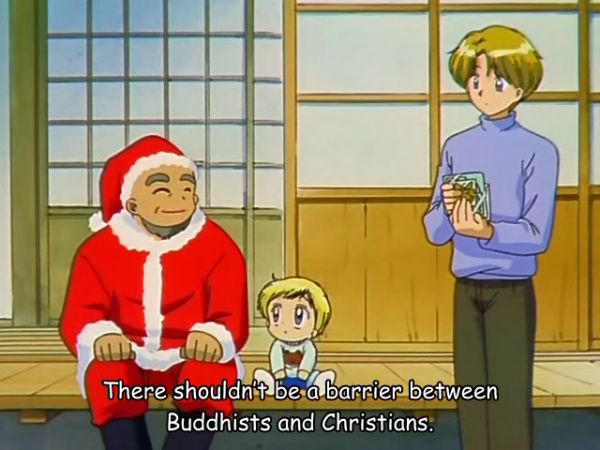
“There should not be a barrier between Buddhists and Christians” says the Buddhist monk in a Santa Claus costume. Christmas has become a widely celebrated holiday in Japan, among other places, Â far from its snowy home in Bethlehem… wait…
Here in Norway, Christmas Eve is the high point of the Yule holiday. Around 5 o’clock, more precisely, though it may perhaps be later now that both adults and children stay up longer in the evenings. But it used to be 5 PM, if my memory serves. Church bells would ring, Christmas songs would be played on the radio, and families would gather around the Christmas Tree. A long evening of heavy food, gifts (usually already placed under the tree) and sugary treats would follow.
(A large number of Norwegians also celebrate Christmas as if it was not about the miracle in Bethlehem but rather the miracle in Cana, where Jesus turned water to wine. My family never took part in any alcoholic celebration, and I personally am not influenced by alcohol on a personality level, only in a purely physical sense.)
Living alone, I don’t celebrate Christmas in any outward way, although I enjoy classic Christmas songs all through the month and more frequently turn my thought to the mystery of the Incarnation.
I have a running joke about Christmas Eve, going like this: “Why is everyone talking about Christmas Eve? What about Christmas Adam?” Of course, arguably Jesus Christ is the “Christmas Adam”, as the Bible says elsewhere, “The first Adam became a living soul; the second Adam became a lifegiving spirit.”
This year, however, the voices in my head had a little fun. I hope it is not too blasphemous.
“Why is everyone talking about Christmas Eve?”
“It is short for Evolution. Like in Adam and Evolution. That sounds too long, you have already forgotten Adam when you come to the end. So people use the nickname, Eve.”
(At the time of writing, I was unaware that generations ago, the story of Adam and Eve was in fact performed as a prelude to Christmas, and presumably is one of the roots, as it were, of the Christmas tree. Whoa.)
Christmas certainly has evolved! The first centuries of Christian history has no sign of celebration of Jesus’ birthday. Although the relevant parts of the gospel were in place already in the earliest known manuscripts, nobody made an attempt to celebrate it or even set a date until the Age of Martyrs came to an end. When Christianity was accepted by the Roman emperors, Jesus’ birthday was quietly aligned with the celebration of Sol Invictus. Christianity has after that gradually absorbed various pagan Solstice rituals, and this evolution has continued into my own lifetime.
The Christmas tree appears as late as the 15th century, and did not become widespread until a century later. Christmas trees in homes appear a couple hundred years ago.
Santa Claus is named for the bishop Nicholas of Myra, who was famous for his timely gifts. However, the modern character is merged with Nordic mythical creatures who protected the farms, often thought to be the spirits of the farm’s founder, or underground gnomes. Santa Claus has only gained his current form very recently, in my lifetime, and is taking over Christmas from Jesus to some extent, being less controversial. (Not that this says much.)
But while Christmas itself has evolved, it has also played an important role in the evolution of our society. For the celebration of a helpless child as God has year by year, generation by generation, increased our respect for children. It still has a long way to go for many people, but you will hardly believe the callous disregard for children that was common by the onset of the Christian Era. Both the Greeks and the Vikings allowed a man to kill his infants at his own whim, with no repercussions of any kind. (One theory of the Viking expansion is that it stemmed from a search for wives, as too many girl babies were killed by their fathers as useless in war.)
The bonding of babies and parents that is universally accepted as a good thing was often deliberately avoided in the past, something that may have made sense on a practical level with the high infant mortality. But the importance of this early bonding for healthy emotional and intellectual development is a major part of modern psychology. In a manner of speaking, the relative humanism of modern western civilization can trace its evolution back to the little child in the crib.
